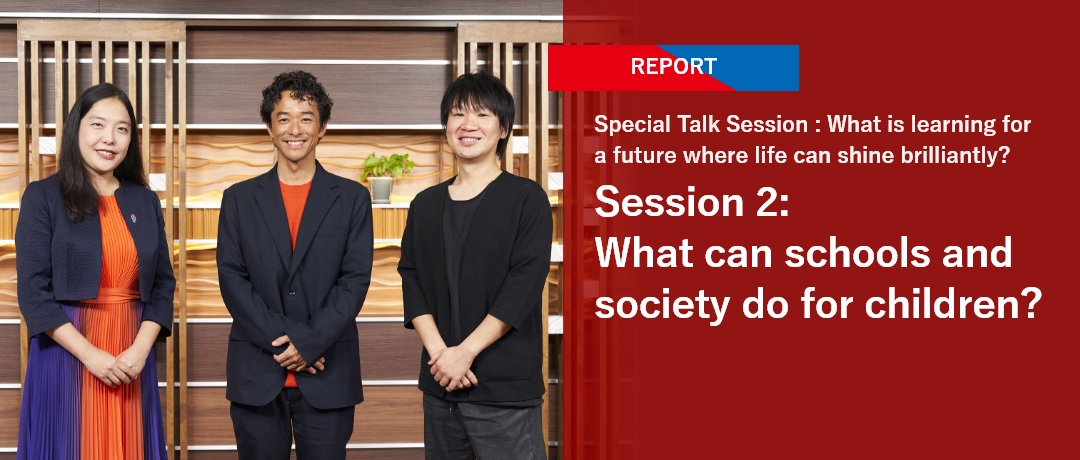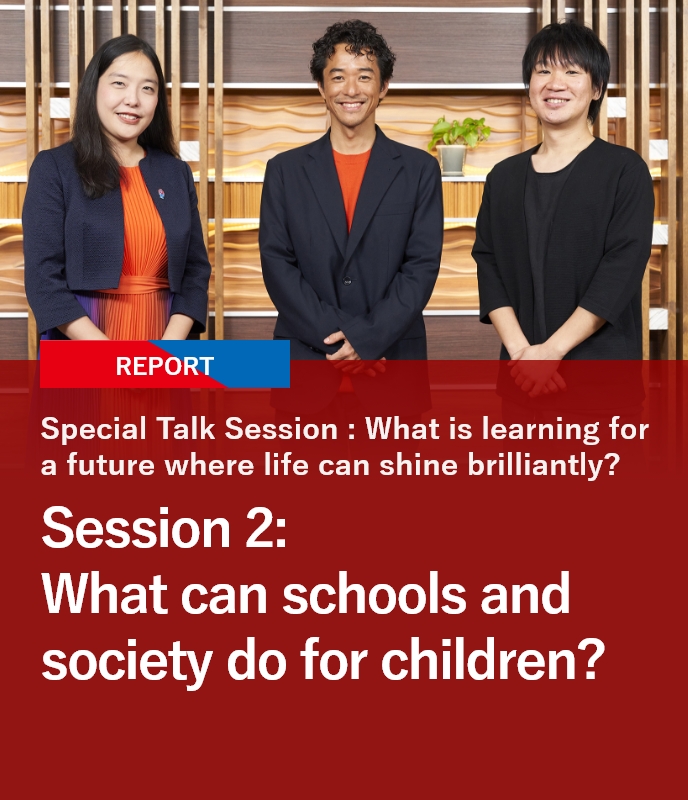The theme of World Expo Osaka-Kansai 2025 is “Designing Future Society for Our Lives.” What shape should learning take so that young people and children who will become our future leaders can shine? As a Thematic Project Producer for World Expo Osaka-Kansai as well as an educator, mathematician, and musician, Sachiko Nakajima wears many hats. She served as the navigator for this expert talk session on the topic of learning for a future where life can shine brilliantly. In the second installment of this series, Ms. Nakajima discussed what schools and society can do for children together with Kenji Kohashi, the Event Planning Producer for Expo Osaka-Kansai 2025, and Mr. Hidekazu Shoto, a teacher at Ritsumeikan Primary School.
Profile
Sachiko Nakajima
Nakajima earned her bachelor’s degree from the Department of Mathematics of the School of Science at the University of Tokyo. In her second year of high school, she became the first Japanese woman to win a gold medal at the International Mathematical Olympiad in India. She took a liking to piano and composition at an early age and began her music career in earnest during university. In 2017, she founded steAm Inc. to promote the widespread adoption of STEAM education. She serves as the Producer for the “Invigorating Lives” Thematic Project of World Expo Osaka-Kansai 2025.
Kenji Kohashi
Kohashi made his debut in the entertainment industry in 1988 at the age of eight. Since then, he has appeared in numerous dramas, movies, and plays, and in 2007, he suspended his acting career. After traveling around the world, he began producing films and events. In addition to producing the Ultra Japan music festival and a futuristic fireworks show called Start Island, he was in charge of the overall direction of the closing ceremony of the Tokyo 2020 Paralympics. He serves as the Event Planning Producer for World Expo Osaka-Kansai 2025.
Hidekazu Shoto
In 2019, Shoto was the first Japanese elementary school teacher to be selected as one of the top 10 outstanding teachers in the world for the Global Teacher Prize, which garnered 30,000 entries from over 150 countries. His other roles include edutainment producer for the Educational Edition of the Momotaro Dentetsu video game. His major publications include "Learn from the World's Top Teacher: An English Textbook that Will Change Your Child's Future" (Kodansha, Ltd.).
Leading an authentic life surrounded by your many likes
Nakajima: An important key phrase for World Expo Osaka-Kansai is “the brilliance of life.” First, I would like to ask both of you what you think it meant by “the brilliance of life.”
Kohashi: I think it means creating the story of your true self where you can shine. However, it is quite difficult to know your true self. I believe that it is something that you can only discover once you’ve been left exposed in some way.
Nakajima: Mr. Kohashi, you often talk about the significance of festivals and other experiences that leave you exposed. You call them out-of-the-ordinary venues that encompass our everyday struggles.
Kohashi: Yes. I believe that the instinctive or primal feeling of "being alive" can be obtained through experiences where you forget yourself, which occur outside of our usual comfort zones.
Nakajima: Mr. Shoto, what do you think “the brilliance of life” means?
Shoto: Given my profession, I am often asked what skills will be useful in the future, but with the advancement of AI and the way society is changing, I honestly don't know anymore. That being said, the image I get of a “brilliant life” is rather clear—being surrounded by your many likes. For example, no matter how amazing the pictures created by AI may be, if someone likes to paint, they are going to paint.
Nakajima: Indeed. But as we grow older, don't you think we tend to compare ourselves with others or start to think "maybe I don't like this very much anymore"?
Shoto: Essentially, it does not matter whether you are good or bad at what you like, nor is it necessary to limit yourself to a single thing you like. It would be nice if we had an atmosphere where everyone could express what they like more spontaneously. Also, today's children live at the speed of short videos, so the shelf life of their likes is very short. Therefore, if the first stage is to provide people with a variety of experiences where they can encounter various things they might like, then I think the next stage should be a more exploratory one where they can immerse themselves in research, creation, and experimentation.
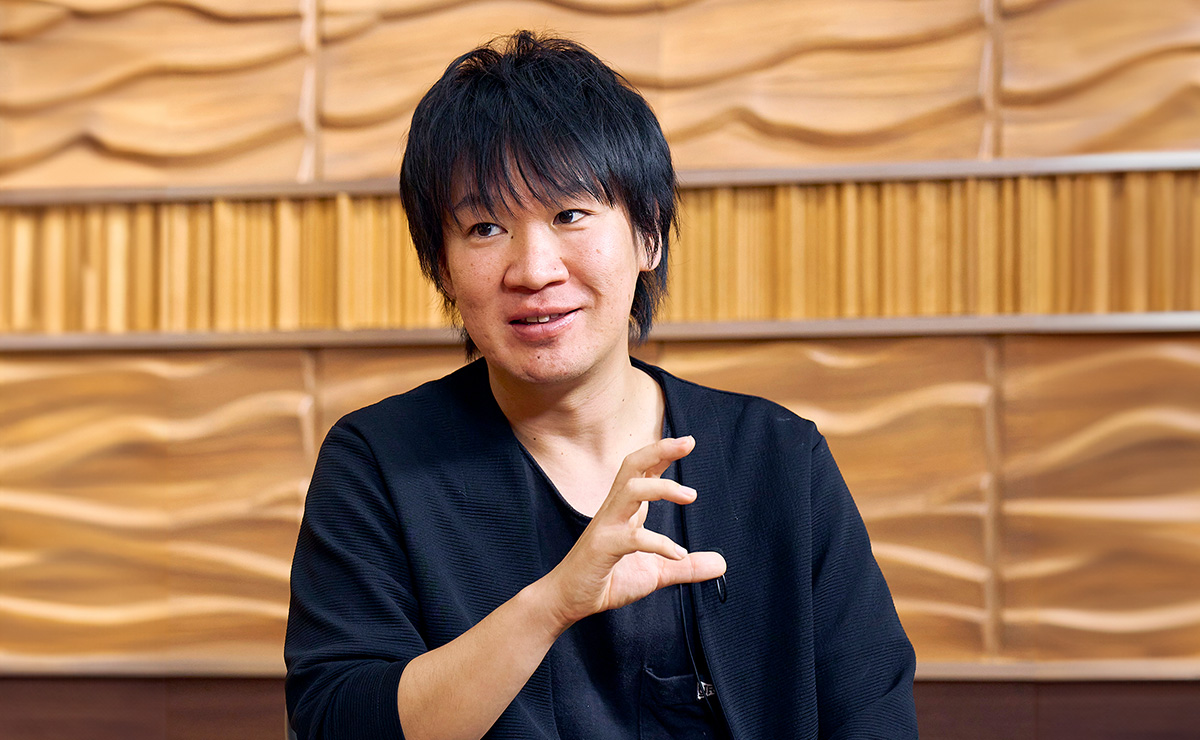
A society that encourages people to tackle challenges will create the “learning of the future”
Nakajima: Mr. Kohashi, what do you think is necessary for learning for a future where life can shine brilliantly?
Kohashi: I think people need to tackle challenges at the individual level. The challenges that each and every one of us choose to tackle lead to new discoveries and encounters with a new side of ourselves. This is why I would like society to become a place where people can try new things without fear of failure.
Nakajima: Yes, it is tough for us to reveal our failures and weaknesses.
Shoto: We can't reveal our failures and weaknesses because, when you do, there are people who will say things you don't want to hear. They say these unpleasant things because they don’t have any likes of their own. If you know that there are far more interesting things to do than to demean others, then you don't worry about what others think, and you can develop an equal relationship with them by saying, "I like this, but you like that.”
Kohashi: Exactly. I think it is useful for people to have another identity as a way to encourage themselves to try new things. Having a different self from your usual self, such as creating an online avatar or joining a community separate from your main occupation, will make it easier to tackle new challenges.
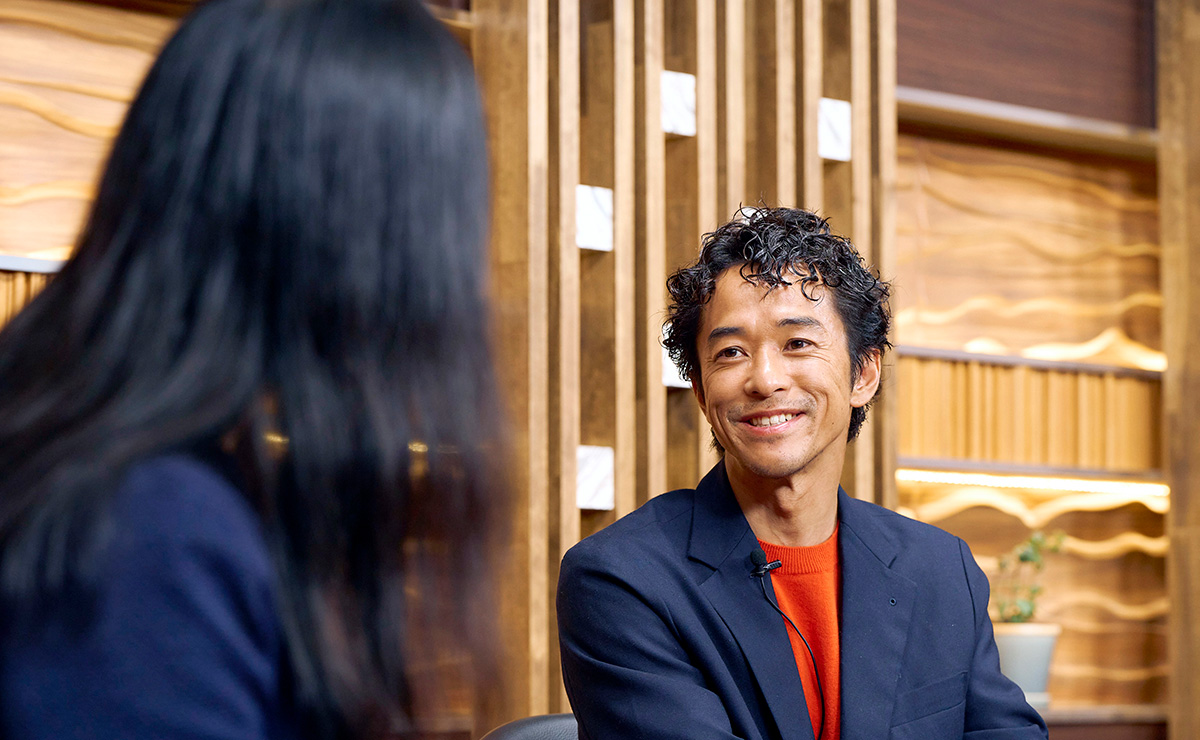
Only adults separate learning from play. Learning in unstructured environments
Nakajima: Mr. Shoto is an advocate of "edutainment," a cross between education and entertainment, and his English classes utilizing Minecraft, a hugely popular video game with children, have been a big hit.
Shoto: The secret to improving English is to make mistakes first and then learn from feedback, but children are too shy to speak. So, I decided to put them in groups and have them make something in Minecraft. When I told them they could only communicate in English, the fun they were having playing with Minecraft outweighed their embarrassment at making mistakes, and they began to speak more and more.
Nakajima: Are you saying it’s not our job to think we need to make them learn?
Shoto: Yes. Only adults separate learning from play. For children, essentially, something is either fun or not fun. Therefore, the moment you try to make something a learning method, it becomes unenjoyable. It is impossible to control whether or not the students actually learned anything, and while it is ideal if you can say that they learned something without realizing it, this requires sufficient time and space, which is a challenge.
Nakajima: The Playground of Life: Jellyfish Pavilion, the Expo pavilion I am working on, was born from the very idea that unstructured play is important. For creativity, what we think is actually important is a place and time to play aimlessly.
Kohashi: Having a goal is not a bad thing, but you can become bound by that goal. For example, it is no fun to travel according to a rigid itinerary. The chance happenings are the best part of a trip.
The digital is the “democratization of creation.” Cultivating sensibility with real experiences
Nakajima: Unlike previous games, in which you had to win in a given setting, Minecraft is a game in which you create your own world.
Shoto: That's right. There is no goal.
Nakajima: Just as the invention of the printing press liberated knowledge that was once reserved for the privileged classes, I find it interesting that digital technology now allows everyone to express themselves interactively.The 21st century just might be an era in which the "democratization of creativity," including both the digital and the analog, will be promoted even more.
Kohashi: Digital tools are extensions of real ones. By removing physical and financial obstacles, many people now have the opportunity to do things that would be difficult to participate in or attempt in real life, and it is now possible for individuals to express themselves as creators. Everyone participates as a creator, and the scale and power of what they can build up is considerable.
Shoto: The other day, I taught a class where we used Minecraft to consider renovations to an abandoned school building. Because we were using a digital tool, we could redo it as many times as we liked without any cost for making mistakes. I thought it would be good to give the kids an opportunity to experience a lot of failure. That being said, I also believe that ultimately it is important to translate what you do into the real world because the digital experience still pales in comparison to the real-life immersive experience. In my experience, I find that kids are very attracted to anything that has any of the following three things: the dark, being barefoot, and using water.
Kohashi: That is interesting. In the age of AI, I think what humans will need is a sensibility for art and a sensibility for heart. I have always felt that these sensibilities, especially heart, can only really be cultivated through real experiences.
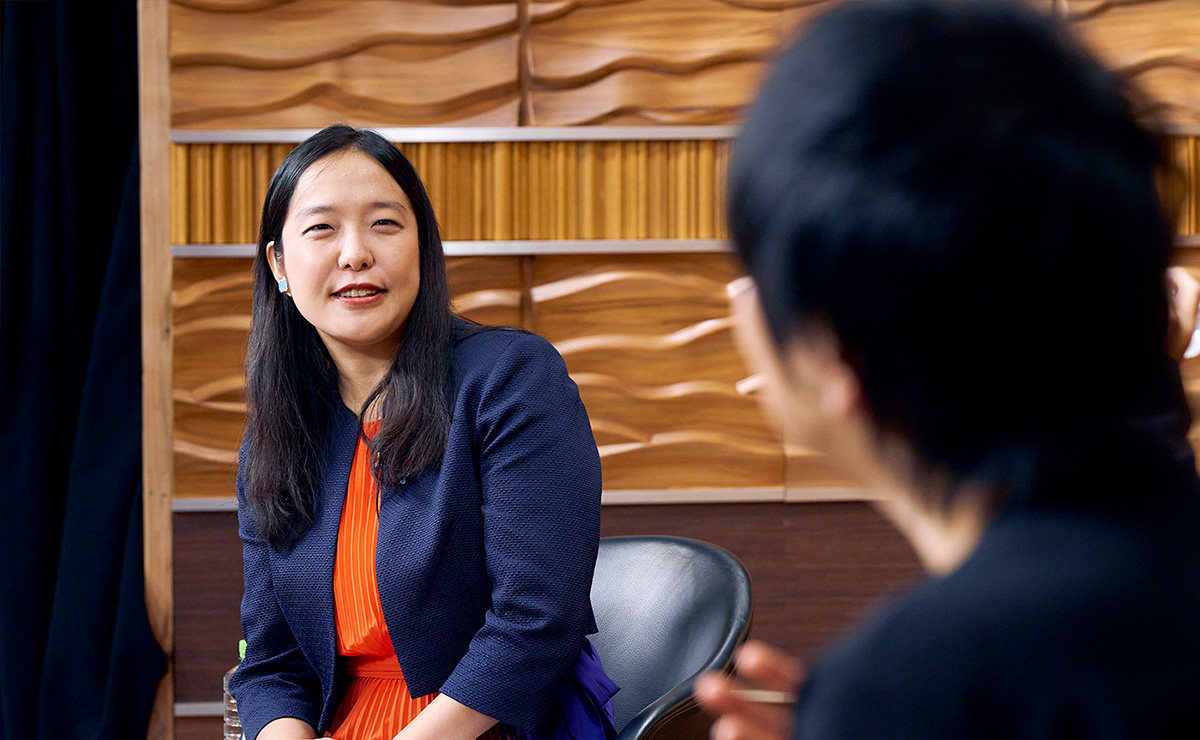
World Expo is a diverse “civic festival.” Individuals engaged in co-creation will lead us into the next generation
Nakajima: Earlier I mentioned the "democratization of creation," and in this sense, I believe that World Expo also functions as a "civic festival.” It is an event that is created by everyone and where everyone supports each other. “Designing Future Society for Our Lives” entails creating a society and a culture where everyone can freely tackle new challenges without fear of failure, so I think it will be important for everyone to partake in that endeavor.
Shoto: Success involves various uncertainties, such as luck, talent, and money, but failure is reproducible because you identify what you shouldn’t do. I think sharing failures has tens of thousands of times more value than sharing successes.
Kohashi: World Expo is a testing ground for the future. We hope that through various chance happenings and the intermingling of diverse values, it will be a great opportunity for everyone get to know their true selves and “update” themselves.
Shoto: I hope that the diverse experiences at World Expo will increase the number of likes that children have. I also hope children will be able to proudly relay the story of World Expo to their grandchildren in the future.
